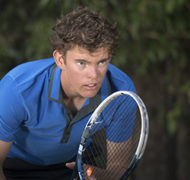How a Parent’s Love Endures
Blog / Produced by The High Calling
Recently, we signed up both of our boys (Wyatt 11, Seth 9) for the University of Virginia Junior Tennis Team camp—six weeks of daily tennis instruction and summer fun. I wanted the boys to receive focused exposure to a sport Miska and I hope to become a family affair. Though neither of our boys have played much tennis, I understood the Junior Team to be for all ages and skill levels, so I was confident this would be a calm entry, easing them into the joy of the game.
When we first told the boys about the Junior Tennis Team, they were eager. However, as camp neared, their anxiety piqued. “I’ll be the worse one there,” moaned one. “I don’t want anyone to watch me,” the other worried, “I’ll be embarrassed.” The weekend before camp was to begin, they concocted elaborate reasons for why they should drop out. Over the previous year, they have asked us to buy them rackets and have regularly cajoled us to haul them to the courts; but in the hours before the camp’s start, they abruptly developed an inexplicable dislike for the sport. When this excuse gained no ground, they developed a sudden economic acumen, convinced the entire tennis project was simply too burdensome for our family budget.
Repeatedly, I assured them there would be numerous beginners just like them, and the camp would be loads of fun. As I drove them to Snyder Tennis Center, both boys were in distress. Wyatt went the histrionic route, forcing himself to breathe heavy, as if hyperventilating. “I’m having a stress attack,” he said amid heaves (Wyatt meant “panic attack,” but who am I to quibble with a boy’s drama?). Seth took the martyr role, sitting forlornly and telling us of the certain doom awaiting him: “I’m going to come home with a black eye.”
We walked to the courts and waited for the staff. I watched the rest of the campers in their high-end tennis gear already busy, confidently knocking the ball about, like they owned the joint. One player, maybe eleven or twelve, was zinging serves that would have required a scramble for me to return. Everywhere I turned, the same fast pace and advanced skill. I looked at my boys, with their bargain rackets, as they watched wide-eyed at the aggressive play of their counterparts. I had made a serious miscalculation. Our two would surely have fun, but the truth was spread across these green hardcourts: my boys were about to get smoked.
As I left the boys and walked to my car, I fought the urge to corner the coach and arrange an easy time for them. I wanted to turn back and comfort the boys and absorb the shock they were about to endure.
That afternoon, I remembered an evening thirty years ago when I sat on a wooden chair with a towel wrapped around my neck. My dad was cutting my hair with electric clippers, but it was obvious what he really wanted was to talk. “Are you sure you want to start football?” he asked, attempting a nonchalant tone. “You know, you started school a year early, so the other boys are bigger and stronger than you.” I now know the care my dad felt, the twinge in his gut. This is the worry every father knows when we release our daughter or our son into a world that may well chew them up and spit them out.
I assured my dad I wanted to try for a spot on the team. “Well, give it your best, son. And if you ever decide it’s not for you, I’m behind you. You don’t have to play football to make me proud of you.” This was my dad’s parting gift, his blessing, the moment when he strapped on his own courage even as he laid the foundation for mine.
The other boys were indeed bigger and faster. That first year, most of my opportunities to be on the field were spent flat on my back. I was beaten and bruised and truly a sorry football player. But I loved every minute of it. I used to think that on that evening cutting my hair, my dad was concerned I wouldn’t be able to endure the pain. I now know the truth: my dad worried he would be unable to bear it.
The love of a mother and father must, like St. Paul said, endure all things, even the heaving convulsions of our own hearts.




